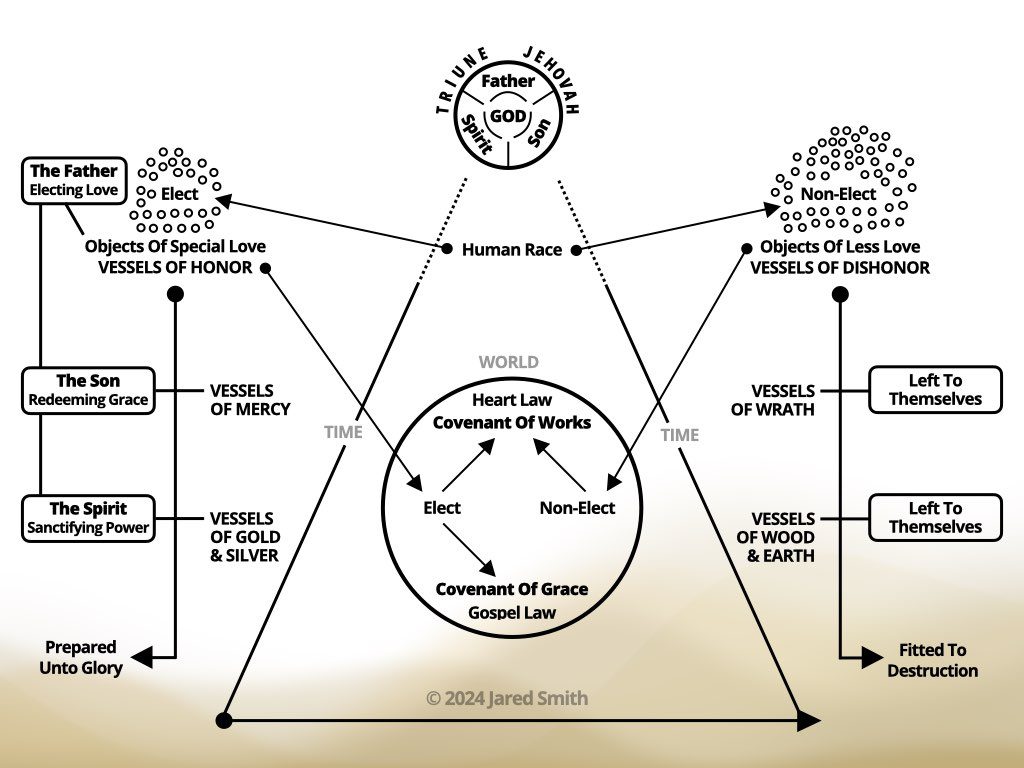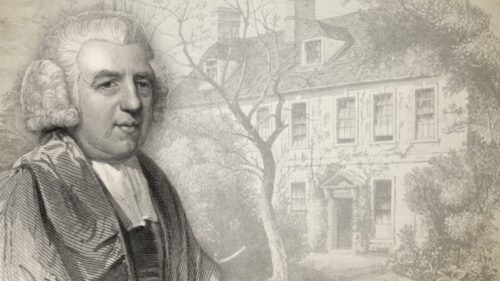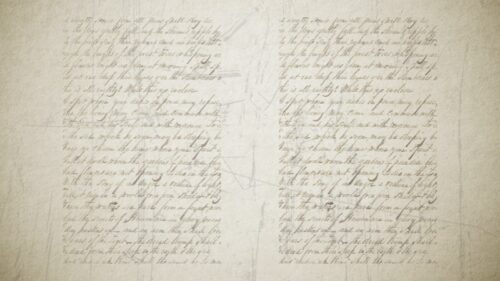All The Way My Savior Leads Me
[An automated transcript of the teaching video]
The Apostle Paul instructed the churches at Colosse to teach and admonish one another in psalms, hymns and spiritual songs. That’s what I intend to do by explaining the meaning of this hymn—All The Way My Savior Leads Me. And I’d like to give an explanation according to the Framework of Sovereign Grace, which is God’s master plan for the ages.

You’ll notice the hymn was written by Fanny Crosby. This was a 19th century American poet and composer. In fact, she wrote more than 8,000 hymns, of which of course, this is one of them. Allow me to read for you the three stanzas of the hymn:
1 All the way my Savior leads me,
What have I to ask beside?
Can I doubt His tender mercy,
Who through life has been my Guide?
Heav’nly peace, divinest comfort,
Here by faith in Him to dwell!
For I know, whate’er befall me,
Jesus doeth all things well.
2 All the way my Savior leads me,
Cheers each winding path I tread,
Gives me grace for every trial,
Feeds me with the living Bread.
Though my weary steps may falter,
And my soul athirst may be,
Gushing from the Rock before me,
Lo! A spring of joy I see.
3 All the way my Savior leads me,
O the fullness of His love!
Perfect rest to me is promised,
In my Father’s house above.
When my spirit, clothed immortal,
Wings its flight to realms of day,
This my song through endless ages:
Jesus led me all the way.
This hymn is all about the believer’s earthly pilgrimage—particularly with reference to the believer receiving guidance from the Lord for his or her journey through life. And, therefore, the subject of the hymn comes under the third branch of the gospel—the sanctifying power of the Holy Spirit. You see, having been regenerated by the Spirit of God, we become strangers and pilgrims in this world.
Let’s let this dot (pointing to the onscreen notes) represent the life of a believer; and the squiggly line behind that dot and in front of that dot represents the winding path from birth to death. And that’s the subject of this hymn, you see. And according to the Framework of Sovereign Grace, it is the sanctifying power of the Holy Spirit in the life of this individual that enables that man or woman to live as a stranger and a pilgrim in this world. For our eyes are set upon another country; a heavenly country; glory, for which we have been prepared. Now, we haven’t yet reached heaven and therefore as strangers and pilgrims on this earth, one of the deepest desires we have is to be safely guided on our journey. Who then will guide us?
Well, some Christians look to themselves for guidance, but we mustn’t do that. We’re certainly not endowed with the necessary wisdom to chart our own course. You remember, for instance, the teachings of Solomon to his son. He told his son to trust in the Lord with all his heart and to not lean unto his own understanding. Solomon told his son that in all his ways he was to acknowledge the Lord and it would therefore be the Lord who would direct his paths. You see, we mustn’t be wise in our own eyes or prudent in our own sight, so we cannot look to ourselves for guidance.
Nor should we be looking to others for guidance. Many Christians, for instance, will receive their direction from their parents, or from a spouse, or other friends and family, but we mustn’t go to them to navigate our course. None of our family or friends are equipped with sufficient wisdom to chart our course in life. King David, for instance—he said, some trust in chariots and some trust in horses, but we will remember the name of the Lord our God. You see, the chariots and horses referred to by David are a reference to a well arranged army under the command and direction of a well-seasoned general. And forthwith, says David, the soldiers preparing for battle will put their trust in that general and their commanding officers, but it is foolish to put one’s trust in man—in chariots and horses—no matter how experienced one might be in the battlefields of life. You see, my friend, our trust must always be in the Lord our God and we must therefore look to him for direction and guidance in our pilgrimage. That’s the theme of this hymn.
Now, before we look at the stanzas, I believe it’s appropriate that we answer a basic question about the guidance of the Lord. How does a believer in Christ receive guidance from God? Well, you won’t have an audible voice spoken in your physical ears, but if you’ve been born again, you will have a spiritual voice spoken to your heart. The spirit of God will speak to your soul. He will manifest to you His presence and He will also press upon you certain inclinations and convictions. Now, how do you know those inclinations and convictions come from the Spirit of God? Well, those inclinations and convictions will be strengthened when you turn to God’s word and you read of the principles, and precepts, and prohibitions, and promises of Scripture. And, as the Word of God communicates to your soul and aligns with the inclinations and convictions given to you by the Holy Spirit, this will become a strengthening force that will enable you to know these inclinations and convictions truly come from God. But in addition to this, not only does the Word of God strengthen these inclinations and convictions, but circumstantially or providentially, God will confirm those inclinations and convictions with something we usually refer to as open and closed doors. As God opens or closes the doors of providence or circumstances, this enables us to know whether or not those inclinations and convictions come from the Spirit of God. Now, let me caution you. Not every open door should be walked through and not every closed door should be walked away from. That is, sometimes a door will open as a test, where we are to exercise discernment. Even though the door has opened, if that door violates the principles, precepts, prohibitions and promises of Scripture, we should not walk through it. And likewise, just because a door has closed does not necessarily mean these specific convictions and inclinations are not from the Lord. Sometimes the Lord will have a door closed for a designated period of time in order that we, his people, might be driven nearer to Him in devotion and petition, after which the Lord will be pleased to open that door. And you see, that is the meaning, therefore, of waiting patiently on the Lord for Him to bring to pass His purposes for our lives.
That is my practical guidance to you on how a believer is guided by the Lord. Now let’s take a look at the stanzas of the hymn:
Stanza 1
All the way my Savior leads me,
What have I to ask beside?
Can I doubt His tender mercy,
Who through life has been my Guide?
Heav’nly peace, divinest comfort,
Here by faith in Him to dwell!
For I know, whate’er befall me,
Jesus doeth all things well.
You know, my friend, there is one Bible character who comes to mind that was able to sing the words of this hymn. Though they weren’t available to him at that time to sing, he could sing the spirit of these words. That man is Job. You know, Job lived during the time of Jacob and Joseph, and therefore his story fits somewhere in the latter part of the book of Genesis. And of course, his story is recorded in the book that bears his name. We’re told that Job was a perfect and upright man, that he feared the Lord, that he eschewed evil. That simply means he had been regenerated by the Spirit of God and he knew himself forgiven of his sins; forgiven of his sins and therefore freely justified through the redemption that’s in Christ Jesus. Job knew this. This man was very wealthy. He lived in the land of Uz, and in that place he owned large fields of land, many cattle, and crops, and servants. He had a large family: a wife, seven sons, three daughters. And in a single day it pleased the Lord to bring devastating affliction into that man’s life. He lost everything—“for I know whatever befalls me, Jesus doeth all things well!” Job could say that in his heart. He lost everything. But somebody once said to me, ’At least Job didn’t lose his wife.’ And, while there is some truth to that—the wife of Job did not die—however, after Job lost all of these things and he had torn off his clothes and shaved his head and he’s sitting in dust and ashes, his wife looks at his pitiful condition and she says to him, ‘Do you still retain your integrity? Now, why don’t you curse God and die!’ That is, kill yourself. Now, I don’t know about you my friend, but I don’t believe that that is a very supportive wife in the time of her husband’s need. In fact, that is evidence that she did not even know the Lord. She had a hatred towards the Lord and she despised Job for his worshiping of the Lord. And she took the opportunity to make things even worse for her husband’s plight. Now, I say all of these things because a little later on in the story, Job gives a testimony. Job said—in light of all that he had lost—Job said, though God slay me, yet will I trust in him! Though He slay me, yet I will trust in Him! “For I know whatever befalls me, Jesus doeth all things well!” You see, the reason we know whatever befalls us, Jesus does all things well is because the Lord is righteous in all His ways and He is holy in all His works. And I therefore ask you, my dear friend, in all of your losses and burdens and disappointments and failures and sins and transgressions and all of it, are you able to say with Job, ‘though God slay me, yet I will trust in Him’? Are you able to say with Fanny Crosby, ‘For I know whatever befalls me, Jesus doeth all things well’? The second stanza:
Stanza 2
All the way my Savior leads me,
Cheers each winding path I tread,
Gives me grace for every trial,
Feeds me with the living Bread.
Though my weary steps may falter,
And my soul athirst may be,
Gushing from the Rock before me,
Lo! A spring of joy I see.
You know my friend, we certainly do walk (in our lives) a winding path. But step by step the Lord leads the way. And, even when your weary steps may falter, the Lord will not allow you to be utterly cast down, for, as David testified in Psalm 37, the steps of a good man are ordered by the Lord and he delighteth in his way, though he fall, he shall not be utterly cast down, for the Lord upholdeth him with his hand. David said, I have been young and now am old, and yet have I not seen the righteous forsaken nor his seed begging bread. For, as the hymn tells us, God gives grace for every trial, and He feeds us not only with the earthly bread, but more importantly, with the living bread. Though my weary steps may falter, we are not utterly cast down. Though my soul may thirst—may be athirst—yet gushing from Christ the Rock before me, a spring of joy I see. Stanza three:
Stanza 3
All the way my Savior leads me,
O the fullness of His love!
Perfect rest to me is promised,
In my Father’s house above.
When my spirit, clothed immortal,
Wings its flight to realms of day,
This my song through endless ages:
Jesus led me all the way.
Perfect rest, my dear friend. Perfect rest. Is this not another deep desire you have as a stranger in pilgrim in this world? David had that desire and David expressed that desire for perfect rest. In Psalm 55, David said, my heart is so pained within me and the terrors of death are fallen upon me; fearfulness and trembling are come upon me, and horror hath overwhelmed me. That was the condition of David. And David said, Oh, that I had wings like a dove for then would I fly away and be at rest; lo, then would I wonder far off and remain in the wilderness! Those are the words of David. He wished in the time of his distress that he had wings as a bird that would allow him to fly far from his troubles. Is that not a desire you have sometimes felt so deep in your heart? That God would give you wings to fly far from your pain and your sorrow and and your afflictions?
Well, of course, according to this hymn, there is a promise that one day we will be in glory. There’ll be no more pain, no more suffering, no more tears. But that, my dear friend, doesn’t help us so much now, does it? I mean, it gives us a hope for a time to come, but not much help for our current place in our pilgrimage. Now, the question you must have as I have—is there not a perfect rest that God is able to give to me now in my earthly pilgrimage? And the good news is that yes, there is a perfect rest that even now, today, at this moment, God is able to fill your heart. It’s an invitation Jesus Christ Himself gives. Jesus says, Come unto Me, all ye that labor and are heavy laden and I will give you rest. Take My yoke upon you and learn of Me. For I am meek and I am lowly in heart and you will find rest unto your souls. For, says Jesus, My yoke is easy and My burden is light! O, to be yoked with Christ. That is where you will find perfect rest, my dear friend. And this of course is the fullness of His love—the love of the Father by choosing us, the love of the Son by redeeming us and the love of the Spirit sanctifying us. That is the fullness of the love of God and we can enjoy it.
Now, please listen to me. You do not need to wait till you get to heaven to sing this song through the ages—that Jesus has led you all the way. You can sing that song today, in this moment—Jesus led me all the way. Is that your testimony? If so, then sing this song to the glory of God and the edification and rejoicing of your soul!
Jared Smith served twenty years as pastor of a Strict and Particular Baptist church in Kensington (London, England). He now serves as an Evangelist in the Philippines, preaching the gospel, organizing churches and training gospel preachers.
Jared Smith's Online Worship Services
Jared Smith's Sermons
Jared Smith on the Gospel Message
Jared Smith on the Biblical Covenants
Jared Smith on 18th Century Covenant Theology (Hyper-Calvinism)
Jared Smith on the Gospel Law
Jared Smith on Bible Doctrine
Jared Smith on Bible Reading
Jared Smith's Hymn Studies
Jared Smith on Eldership
Jared Smith's Studies In Genesis
Jared Smith's Studies in Romans
Jared Smith on Various Issues
Jared Smith, Covenant Baptist Church, Philippines
Jared Smith's Maternal Ancestry (Complete)






